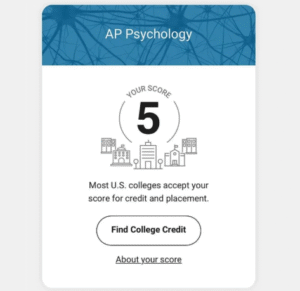x min read

Introduction
Choosing the right Advanced Placement (AP) classes is a pivotal decision in your academic journey. These courses offer a chance to delve deeper into subjects you’re passionate about and can earn you valuable college credits. However, it’s essential to select the AP courses that align with your interests, strengths, and future goals.
Here, in this relatively short guide, you’ll be introduced to the perfect criteria for choosing AP classes tailored just for you.
1. Identify Your Interests
What subjects in school interest you more than others? Is it Science? Is it History? Is it writing? Confirm the biggest interests that you have, and then see if that exists as a class. For example, if you’re interested in world wars, and like studying modern history, then AP World History Modern might just be the perfect choice for you.
Just note that there is a large quantity of AP courses, so don’t feel pressured into taking an AP class just because it’s on a core subject (Math, English, History, Science).
If you’d like to take a deeper look into a course’s content and see if it would seriously interest you, I suggest taking a look at its units, what the final exam covers, what the assignments are like, etc. Feel free to read any guides online or watch any YouTube videos.
2. Assess Your Strengths
The next step is to understand what you’re good at. Where are you academically weak and strong? In which subjects do you excel in, and in which ones do you not? The main idea here is that you choose AP courses that capitalize on your strengths while challenging yourself to grow in areas demanding for improvement. At the end of the day, did you really expect to do well in an advanced biology class if one of your most dreaded subjects is science in general?
3. Consider Your Career Goals
When you search for a job, and search for employment, what AP courses are going to prove to be the most pivotal? Are you sure that one class in Junior yearn is really going to provide value when you’re looking for a high-paying job in whatever field you’re studying for?
Ensure that you choose AP courses that align with your career goals. For instance, if you aspire to be an engineer, AP Calculus and AP Physics might be essential.
4. Seek Guidance
Besides just doing everything on your own, consider also asking others. Whether that’d be a classmate, friend, counselor, teacher, or anyone really. When one is confident in taking a certain class, it makes taking that specific class so much easier.
5. The Course Load
The is arguably the most important consideration when it comes to choosing an AP class. How heavy is the work load? Look, if you’re choosing a class because others say that it’s easy (whether that’d be in person or online), you need to see for yourself first. I could sit here and name the best classes to take for each student, but that wouldn’t make sense. Every person is different.
How to make a Decision
Although maybe one AP class has a lot of homework, there may be some students out there that find it to be relatively easy to complete because they are either extremely interested in the subject, or just naturally gifted at it. Whatever the excuse is, you need to be aware of a course’s work load. Some classes offer a reasonable amount, while others don’t. It’s your job to verify if it’s right for you.
As a reminder, if you are interested in a certain AP class, but (according to many sources) there’s a lot of work given out in that class, don’t be afraid of taking it. If you are truly interested in the subject, and would study it just for fun, why not give it a try? If you don’t like it, you switch out asap. If you like it, continue through the year.
Time Management & Work/Life Balance
Another important reason about considering your course load is also for time management purposes. Just think: will this one AP class utterly ruin my work/life balance, or will it not? Yeah, you could be that one person that just sits at his desk all day, and works. But, that’s no life. Although you are preparing yourself for the future, you have to be aware of the life around you. The life surrounding you won’t be around for long, so be sure to enjoy as much of it as you can.
6. Consider The Prerequisites
There are a multitude of classes that do have requirements before being able to take the class. So, of course, if a course you want to take has some (or one), complete them. Take AP Lang as an example, a student must first complete 2 years of English before they can take that class.
7. Research College Credit Policies
Colleges have varying AP credit policies; so, be sure that your AP courses align with the colleges that you’re considering.
8. Explore & Listen to Your Gut
Just because there are a lot of limiting factors out there doesn’t mean that you can’t or shouldn’t try new things. If there’s a new AP class that seems interesting, and you’re just really not sure, give it a shot! If you don’t like it, you can always switch out of the class whenever you’re able to.
The next tip squeezed into this step is to listen to your gut. No matter how much information and value I may provide here, there will still likely be some of you that are undecided and don’t know what to do. So, this part is for you: listen to your gut. What seems right for you? What doesn’t seem right for you? If a class seems like it’ll be promising, take it. But if it doesn’t, and seems like it’ll be a waste of time, don’t bother. Do what seems right for you, and only you.
Actionable Step
Get a notebook and a pen/pencil and list the few AP classes that you have been interested in taking for a while now (or all the available AP classes if you wish to go to that extent), but have been unsure of taking. Once you have them down, I want you to quickly research each one. Spend a maximum of 5-10 mins research each one. Don’t spend any more time, and no less. We want to understand what each class looks like, but while losing too much time as a result.
After conducting your research, I want you to decide: which AP classes don’t seem as promising anymore? Cross out any that match that description. If there’s none, then that’s good. Next, I want you to see if the course is of high-value for anything important (whether that’d be for school, work, or anything related). To verify if a course is of high value, ask yourself: “how will this course impact my future?” or “does it have any positive impact at all?”. Draw a small check next to the ones that are impactful, and cross out the ones that don’t match such a description.
By this point, you should have two lists. One should be of interests, and the other should be of some sort of value in some manner. The last thing I want you to do here is cross of (if any) all the courses that you chose solely because of the directions above, and if they don’t even seem that interesting. At the end of the day, you should be choosing AP classes that suit you, and only you.
Lastly, you should be left with the perfect list of AP classes, tailored to your liking.

List Images – Unsplash.com
Endnotes
By now, you know everything about choosing the right AP class. No more stressing about classes that are right for you. Those days are over.



